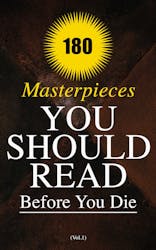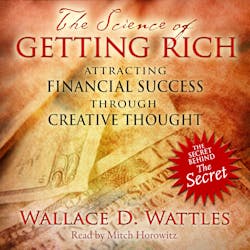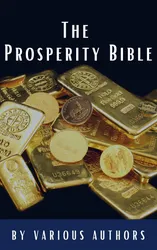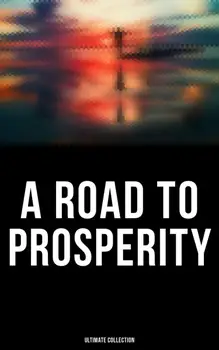A Road to Prosperity - Ultimate Collection masterfully encapsulates an illuminating exploration of success, personal growth, and economic theories, encompassing a spectrum of literary styles from philosophical introspection to pragmatic advice. This anthology juxtaposes timeless wisdom with practical methodology, weaving through the words of some of the most influential thinkers across ages. The collection's signature pieces delve deep into personal motivation, the psychology of wealth, and the spiritual dimensions of prosperity, providing a unique panoramic view of the pursuit of affluence and personal achievement within varying historical and cultural frameworks. The authors and editors, who range from ancient philosophers like Marcus Aurelius to modern self-help pioneers such as Wallace D. Wattles and Orison Swett Marden, lend a diversely rich perspective to the anthology. These contributors have been pivotal in shaping not only the self-help and motivational landscapes but also in influencing economic and philosophical discourses. By integrating texts that span millennia, from the musings of Lao Tzu to the economic critiques of Thorstein Veblen, this collection facilitates a holistic dialogue on prosperity, intertwining moral, economic, and psycho-social threads. A Road to Prosperity - Ultimate Collection is an indispensable resource for anyone eager to explore multifaceted views on success and personal development. The anthology invites readers to traverse through a labyrinth of wisdom laid down through centuries, offering a rare synthesis of reflective and actionable knowledge. Engaging with this collection promises not only a deeper understanding of wealth and prosperity but also stimulates a profound encounter with the philosophies that have shaped human pursuit of a flourishing life.

90 Masterpieces You Must Read (Vol.1) : Novels, Poetry, Plays, Short Stories, Essays, Psychology & Philosophy: The Madman, Moby-Dick, Siddhartha, Crime and Punishment, Hamlet, Great Expectations, Little Women, Meditations, The Einstein Theory, Heart of Darkness, The Red Badge of Courage
Walt Whitman, Herman Hesse, George Eliot, Kahlil Gibran, Anton Chekhov, Herman Melville, Oscar Wilde, Fyodor Dostoevsky, Nikolai Gogol, James Joyce, Henry David Thoreau, William Shakespeare, T. S. Eliot, John Keats, Charles Baudelaire, Walter Scott, Daniel Defoe, Louisa May Alcott, Jane Austen, Charlotte Brontë, Emily Brontë, Anne Brontë, Leo Tolstoy, Benito Pérez Galdós, William Makepeace Thackeray, Pierre Choderlos de Laclos, R.D. Blackmore, Alexandre Dumas, Marcel Proust, D. H. Lawrence, Charles Dickens, Thomas Hardy, Henry James, Guy de Maupassant, Princess Der Ling, Victor Hugo, Juan Valera, Anthony Trollope, Stephen Crane, E. M. Forster, Theodore Dreiser, Margaret Cavendish, Upton Sinclair, Plato, Apuleius, Marcus Aurelius, Sun Tzu, Voltaire, Miguel de Cervantes, Giovanni Boccaccio, Frederick Douglass, Sigmund Freud, H. A. Lorentz, Wallace D. Wattles, James Allen, Agatha Christie, Arthur Conan Doyle, Joseph Conrad, H. P. Lovecraft, Washington Irving, Mary Shelley, H. G. Wells, Edgar Allan Poe, Ernest Hemingway, L. Frank Baum, Robert Louis Stevenson, Mark Twain, Selma Lagerlöf, Jack London, Jules Verne, Lewis Carroll, Frances Hodgson Burnett, Rudyard Kipling, George Bernard Shaw, Soseki Natsume, Johann Wolfgang Goethe, Edgar Rice Burroughs, Brothers Grimm, Hans Christian Andersen
book
180 Masterpieces You Should Read Before You Die (Vol.1) : Leaves of Grass, Siddhartha, Middlemarch, The Jungle, Macbeth, Moby-Dick, A Study in Scarlet, The Call of the Wild, Huckleberry Finn,, The Way We Live Now, Sister Carrie...
Walt Whitman, George Eliot, Herman Hesse, Kahlil Gibran, Anton Chekhov, Herman Melville, Oscar Wilde, Fyodor Dostoevsky, William Shakespeare, Mark Twain, Marcus Aurelius, Nikolai Gogol, James Joyce, Henry David Thoreau, T. S. Eliot, John Keats, Charles Baudelaire, Walter Scott, Daniel Defoe, Louisa May Alcott, Jane Austen, Charlotte Brontë, Emily Brontë, Anne Brontë, Leo Tolstoy, Victor Hugo, Jules Verne, Lewis Carroll, Frances Hodgson Burnett, Brothers Grimm, Hans Christian Andersen, Agatha Christie, Wallace D. Wattles, James Allen, Sigmund Freud, Miguel de Cervantes, Frederick Douglass, Voltaire, Sun Tzu, Plato, Upton Sinclair, Anthony Trollope, E. M. Forster, Theodore Dreiser, Charles Dickens, Thomas Hardy, Henry James, D. H. Lawrence, William Makepeace Thackeray, Marcel Proust, H. G. Wells, Edgar Allan Poe, Ernest Hemingway
book
The Science of Getting Rich : Attracting Financial Success through Creative Thought
Wallace D. Wattles
audiobook
The Science of Being Great: Personal Self-Help Book of Wallace D. Wattles (Complete Edition) : Unleash Your Greatness: Inspiring Personal Growth Wisdom
Wallace D. Wattles
book
The Greatest Books of Spiritual Wisdom : The Age of Reason, As a Man Thinketh, The Holy Spirit…
Saint Augustine, Pope Gregory I, Martin Luther, Friedrich Nietzsche, Thomas Paine, Leo Tolstoy, Athanasius of Alexandria, Gregory of Nyssa, Basil the Great, John of Damascus, Saint Thomas Aquinas, Thomas à Kempis, St. Teresa of Ávila, Brother Lawrence, David Hume, Ludwig Feuerbach, Charles Spurgeon, Andrew Murray, G. K. Chesterton, Arthur Pink, John Stuart Mill, Ralph Waldo Emerson, H. Emilie Cady, James Allen, Prentice Mulford, Florence Scovel Shinn, Wallace D. Wattles
book
The Science of Getting Rich : The Inspiring Guide to Wealth and Success (Classic Edition)
Wallace D. Wattles
book
The Self-Help Classics Collection. Guide to Personal Freedom (40 + books)
Napoleon Hill, Joseph Murphy, Norman Vincent Peale, Wallace D. Wattles, Charles F. Haanel, Florence Scovel Shinn, James Allen, William Walker Atkinson, Neville Goddard
audiobook
Wallace D. Wattles Ultimate Collection – 10 Books in One Volume: The Science of Getting Rich, The Science of Being Well, The Science of Being Great, The Personal Power Course, A New Christ and more
Wallace D. Wattles
book
How to Get What You Want (Unabridged) : Mastering the Art of Manifestation: A Guide to Success and Empowerment through Positive Thinking and Visualization
Wallace D. Wattles
book
180 Masterpieces of World Literature (Vol.1) : Leaves of Grass, Siddhartha, Middlemarch, The Jungle, Macbeth, Moby-Dick, A Study in Scarlet…
Jules Verne, Lewis Carroll, Sigmund Freud, Charles Dickens, Plato, Mark Twain, Walt Whitman, Oscar Wilde, Edgar Allan Poe, William Shakespeare, Charlotte Brontë, Anne Brontë, Emily Brontë, Henry David Thoreau, Henry James, Louisa May Alcott, Victor Hugo, Frances Hodgson Burnett, Jane Austen, Herman Melville, James Allen, George Eliot, Walter Scott, Thomas Hardy, Daniel Defoe, Agatha Christie, Upton Sinclair, Anthony Trollope, Marcel Proust, Charles Baudelaire, William Makepeace Thackeray, Theodore Dreiser, Voltaire, Frederick Douglass, John Keats, James Joyce, Kahlil Gibran, H. G. Wells, T. S. Eliot, D. H. Lawrence, E. M. Forster, Marcus Aurelius, Hans Christian Andersen, Anton Chekhov, Leo Tolstoy, Fyodor Dostoevsky, Nikolai Gogol, Miguel de Cervantes, Wallace D. Wattles, Brothers Grimm, Herman Hesse, Sun Tzu
book
How to Get What You Want
Wallace D. Wattles
book
The Prosperity Bible
George Matthew Adams, James Allen, William Walker Atkinson, Marcus Aurelius, P.T. Barnum, Genevieve Behrend, George S. Clason, Robert Collier, Russell H. Conwell, Emile Coue, Charles Fillmore, Emmet Fox, Benjamin Franklin, Kahlil Gibran, Neville Goddard, Charles F. Haanel, Harvey Hardman, Napoleon Hill, Elbert Hubbard, William Crosbie Hunter, H.A. Lewis, Niccolo Machiavelli, Orison Swett Marden, Joseph Murphy, Miyamoto Musashi, Earl Nightingale, F.W. Sears, Florence Scovel Shinn, Elizabeth Towne, Lao Tzu, Sun Tzu, Wallace D. Wattles, Classics HQ
book
